
Spotify is continuing to grapple with a tidal wave of AI slop that’s frustrating its users.
While the company recently promised to address the issue of AI impersonators and content farms that “push ‘slop’ into the ecosystem, and interfere with authentic artists working to build their careers,” the platform’s paying subscribers are increasingly fed up with being recommended slop.
A quick search on social media reveals that slop continues to find its way into users’ Discover Weekly, which are personalized playlists that refresh every Monday to serve them new music based on their listening habits.
“Discover Weekly is unusable now cause it is just full of AI slop,” one user complained on X-formerly-Twitter.
“Dear Spotify, please stop putting AI music in my Discover Weekly. Sincerely, everyone,” another wrote.
“I had no idea how bad it had gotten, since none of it was being shown to me,” one user wrote on the forum Hacker News. “Then a friend sent me his AI music on Spotify, I listened, and my recommendations were all AI for my usual genres suddenly.”
According to an August 2024 forum post on Spotify’s Community page, the issue has been around for well over a year now.
“It has gotten really bad lately,” a subscriber wrote in a December post. “This week’s Discover Weekly has four [AI-generated] songs in the first five entries. It makes me very sad that this garbage penetrates the recommended playlists of users.”
Many users threatened to jump ship and leave Spotify altogether as a result.
“Six songs out of 30 on my Discover Weekly playlist on Spotify were AI this week,” one user wrote in a Bluesky post. “Ridiculous that Spotify is pushing this crap on us. Looks like that’s it for Spotify.”
It’s a damning trend, with Spotify’s algorithm actively recommending slop to users who are paying monthly for a Premium subscription.
“Spotify has been recommending me so much AI music in my Discover Weekly that I can’t even rely on it for finding new songs anymore,” another Bluesky user lamented.
In the face of it all, Spotify has refused to implement a blanket ban on AI slop. In late September, the company announced a slew of new policies to protect artists against “spam, impersonation, and deception,” including a new “filter” that it says can detect common tactics used by spammers to game its royalties system.
The company also promised to establish “AI disclosures for music with industry-standard credits.”
However, Spotify fell short of forbidding AI tunes entirely, arguing that “music has always been shaped by technology” and that “at its best, AI is unlocking incredible new ways for artists to create music and for listeners to discover it.”
“This journey isn’t new to us,” the company wrote in its announcement at the time. “We’ve invested massively in fighting spam over the past decade. In fact, in the past 12 months alone, a period marked by the explosion of generative AI tools, we’ve removed over 75 million spammy tracks from Spotify.”
While browsing their Discover Weekly playlists, users are finding “songs with weird, all-caps artists with AI pictures in them.” Others have pointed out artists with “no text in bios” and “ten plus releases each in 2025 alone.”
Besides polluting Discover Weekly playlists, we’ve also come across AI-generated impersonations showing up in Spotify’s New Releases playlists, which are designed to automatically surface new music by known artists.
Earlier this year, a self-proclaimed “indie rock band” called The Velvet Sundown made headlines after accumulating millions of streams. The “band” was later revealed to be an “ongoing artistic provocation designed to challenge the boundaries of authorship, identity, and the future of music itself in the age of AI.”
Spotify has also been caught populating the profiles of long-dead artists with AI-generated songs imitating their style.
As reporter Kieran Press-Reynolds argued in a recent column for Pitchfork, the company likely isn’t particularly incentivized to remove AI tracks from its platform.
“Spotify won’t prohibit this music — not because it thinks it’s innovative or ushering in a new era of technological futurism (the platform has never cared about culture) but simply because it’s generating streams,” Press-Reynolds wrote. “If the company actually wants to be transparent and control spam, they need to go way harder.”
More on Spotify: Bon Iver Side Project’s Spotify Page Features an AI Slop Song